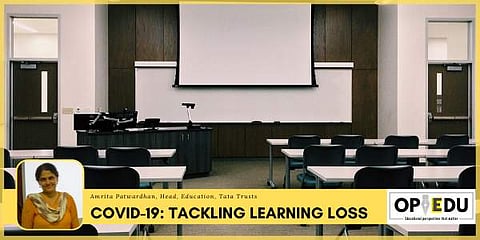

The extensive school closure that started in March 2020 has had diverse effects on students. The experiences of children have differed across geographies and economic backgrounds. Urban privileged children, who in fact are a minority in terms of number, experienced seamless movement to online learning. Such was the case for Aryan - an 11-year-old who lives in a metro and studies at a private school. As soon as the lockdown started in March 2020, Aryan’s parents, who are professionals, were able to provide him with the required support, and arrange for a dedicated device for him to use. His school ensured support to teachers to move online, minimising the impact of physical school closure on learning.
In contrast, only 10 per cent of rural children could experience online classes according to various surveys (ASER, 2020, The School Team 2021). Around one in three children were able to access some learning material through WhatsApp, where there was access to smartphones (ASER 2020). These were the situations faced by 8-year-old Manisha, whose vegetable-vendor father found it hard to purchase recharge packs for his smartphone. Manisha has not been to school in a year and a half and was only able to access some worksheets and videos sent by her teacher on her father’s WhatsApp, when she could access it after her father returned home.
Studies indicate that extended school and Anganwadi closures would have long lasting detrimental effects on student learning and school completion (Azim Premji Foundation, 2021). As secondary schools in many states have opened and primary schools are finally beginning to start in various states, it is imperative we focus on a few things to ensure that schools address children’s learning and developmental needs:
Social emotional wellbeing of children is critical and needs to be a key focus
Children have experienced a lot of isolation, hardship, illness and anxiety in the family and community for long. The economic hardship families have gone through has also impacted children apart from them being deprived of education and friends. As schools open, providing a safe, nurturing space both emotionally and physically is important before rushing to catch up on academics. Play, art, library, conversation with peers and teachers can go a long way in addressing these needs.
Teaching at the right level
Extended school closure and limited learning opportunities for the majority of children have resulted in learning loss which needs to be addressed. This compounds the earlier problem of overall poor learning achievement at the foundational level, which is well documented. Foundational skills need to be assessed and built before completing the content from specific grade level textbooks. Sensitive assessment of children’s actual learning levels and helping children to acquire foundational skills that have been lost is critical before rushing to complete grade level syllabus. Well-designed remedial inputs and practicing skills learned prior to school closure would therefore be important.
Teacher autonomy
Teachers know the situation of their students more than any official in the state or national capital does. Allowing teachers the space and autonomy to decide the pace, extent of curriculum that can be completed, as well as the approach needed, is necessary. Teachers also need to be offered opportunities to deal with socio-emotional issues and the range of learning needs they will have to handle for a year or two after schools restart through quality training and professional development.
Nutrition and health needs special attention
The one and often the only hot cooked meal children were getting in the school in the form of Mid-Day Meal was missed for more than a year. This coupled with overall economic hardships families faced has impacted children’s health and nutrition. Resumption of Mid-Day Meal and special attention to balanced diet would go a long way in addressing the gaps.
Out of school children
Children from disadvantaged communities such as Dalit, tribal and Muslim communities form the majority of out of school children. There is a high likelihood of at-risk children, especially adolescents dropping out of school after long disruption in schooling. Such was the case for 14-year-old Amit from UP, who dropped out of school after his migrant father lost his livelihood and had to take a loan to treat his illness in the midst of the pandemic. Close tracking and special drives to enrol all children in school and providing academic support to master foundational skills is essential in ensuring that children do not drop out of school. UNESCO’s 2020 study projected that 24 million children may not return to schools globally so the scale of the issue for India is likely to be alarming.
Role of community
Extended school closure has highlighted the role of homes and communities in supporting the learning of children, more than ever before. Active engagement with parents and keeping learning spaces in the community active, engaging volunteers to support children’s learning, are some ways to keep this connection going through the coming few years when temporary disruptions to schooling may still occur in different phases of the pandemic.
It is essential that decision making is decentralised so that responses can be suited to the local realities. COVID-19 has impacted Indian states with varying intensities at different points in time. Decisions need to be taken on the basis of the local context allowing schools to choose and manage their instructional days and modalities rather than centralised decisions focused on urban realities.
Extended closure of schools has underlined that learning is essentially a social process. While technology and online learning can supplement learning, interaction between child and teacher, among children is crucial for learning. An inviting learning environment and experiential learning is critical for conceptual understanding to evolve. We owe it to our children to provide a safe and dependable learning space in schools and communities that will assist recovery from pandemic.
Amrita Patwardhan is Head, Education of Tata Trusts. Views expressed are her own.
